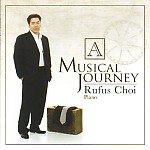Here’s a recital that purports to represent a “musical journey”, complete with a cover pose of pianist Rufus Choi standing next to his suitcase so that no dullard will miss the point. If only Choi’s roadmap hadn’t been so off-base! The cantus firmus and the accompanying voices do not emerge in consistent or logical perspective during Choi’s unusally brisk treatment of the Bach/Busoni Wachet auf, ruft uns die Stimme, while his sectional ritards and tiny tenutos in Nunn komm der Heiden Heiland grow increasingly arch and predictable. Nun freut euch, lieben Christen’s fast and crisp fingerwork leaves little room for the kind of textural differentiation and dynamic build-up you hear in Horowitz’s classic shellac recording, not to mention Busoni’s own rendition from 1922. Although the measured tempo in Ich ruf zu dir, Herr is just right, Choi’s heavy accents impede the flowing line.
Choi’s lean-toned, highly articulated Rachmaninov Second sonata would be easy to recommend without Alexis Weissenberg’s demonic prowess hovering over his shoulder. The Chopin/Liszt My Joys ought to sound more elegant and vocally informed than Choi’s high-strung interpretation conveys; he overbuilds his crescendos and pounds through the work’s climax. Similar words apply to the Schumann/Liszt Widmung. Conversely, in the Liszt Second Rhapsody Choi holds his expressive instincts in check rather than following that held note, rubato, or accelerando all the way through with full conviction; after all, the music can take it. He also provides an uninteresting cadenza that basically reiterates earlier material. Before embarking on his next “journey”, let’s hope Choi gains more experience behind the wheel.
































